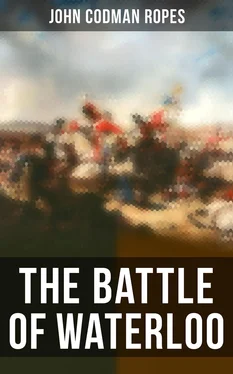John Codman Ropes
Published by

Books
- Advanced Digital Solutions & High-Quality eBook Formatting -
musaicumbooks@okpublishing.info
2021 OK Publishing
EAN 4066338112507
Preface
Chapter I. The Plan of Campaign.
Chapter II. The French Army.
Chapter III. The Allied Armies.
Chapter IV. The Fifteenth of June.—Napoleon.
Chapter V. The Fifteenth of June: Blücher and Wellington.
Chapter VI. The Fifteenth of June: The Dutch-Belgians.
Chapter VII. The Morning of the Sixteenth of June: Wellington.
Chapter VIII. The Morning of the Sixteenth of June: Ney.
Chapter IX. The Morning of the Sixteenth of June: Napoleon.
Chapter X. The Battle of Ligny. Blücher’s Decision to Accept Battle Not Dependent on Wellington’s Assurance of Support.
Chapter XI. The Battle of Ligny.
Chapter XII. The Battle of Quatre Bras.
Chapter XIII. The Seventeenth of June: Napoleon.
Chapter XIV. The Seventeenth of June: Blücher and Wellington.
Chapter XV. The Eighteenth of June: Grouchy and Blücher.
Chapter XVI. The Battle of Waterloo.
Chapter XVII. Concluding Observations.
Appendix A. On Some Characteristics of Napoleon’s Memoirs.
Appendix B. On Marshal Grouchy and the Bertrand Order.
Appendix C.
I.
II.
III.
IV.
V.
VI.
VII.
VIII.
IX.
X.
XI.
XII.
XIII.
XIV.
XV.
XVI.
XVII.
XVIII.
XIX.
XX.
XXI.
XXII.
XXIII.
XXIV.
XXV.
XXVI.
XXVII.
XXVIII.
XXIX.
XXX.
XXXI.
XXXII.
XXXIII.
XXXIV.
Table of Contents
The need of another narrative of the campaign of Waterloo may not be at first sight apparent. There has been a great deal written on this subject, and much of it has been written by eminent hands. The last and the most unfortunate campaign of the great soldier of modern times has naturally attracted the repeated attention of military historians. Jomini, Clausewitz, Charras, Siborne, Kennedy, Chesney, Vaudoncourt, La Tour d’Auvergne, Thiers, Hooper, and many others have sought to explain the almost inexplicable result,—the complete defeat in a very brief campaign of the acknowledged master of modern warfare. One would suppose that the theme had been exhausted, and that nothing more remained to be said.
But several circumstances have contributed to render the labors of these writers unusually difficult. In the first place, the overthrow of Napoleon, which was the immediate result of the campaign, operated to prevent a satisfactory account of it being given to the public from the French point of view at the time when the facts were fresh in men’s minds. The Emperor, exiled at St. Helena, could indeed give his story; but, unable, as he was, to verify or correct his narrative by citations from the orders that were given at the time, and by conferring with the officers who had served under him, he has left us an account, which, though by no means without historical value, is yet so defective and erroneous in parts that it has aroused in the minds of men who are not alive to the great difficulties which always attend the composition of a military narrative, and who are not concerned to make fair allowance for the unavoidable and peculiar difficulties of one writing in the circumstances which surrounded Napoleon at St. Helena, grave doubts as to the trustworthiness of his recollection and even as to his veracity. The chief officers of the army have also rendered little assistance to the historian. Ney was shot a few months after the battle. Soult, Grouchy, d’Erlon and others were forced into exile. No detailed reports were ever made by them. The royal government did not concern itself about this episode in the experience of their predecessors. What the French commander and his subordinates had to say about the campaign came out by degrees, and much of it only after long years of waiting. Many of the narratives were written and published before all the facts had become known,—hence were necessarily more or less imperfect.
With a few exceptions, too, the histories of this campaign have been gravely affected by the partisanship of their authors. It is well-nigh impossible for Thiers and La Tour d’Auvergne to admit any fault, for Charras and Quinet to admit any merit, in Napoleon’s management of affairs. It is equally difficult for the majority of English writers to avoid taking sides against the Emperor in any of the numerous disputes to which the campaign of Waterloo has given rise. These influences have operated in many cases to deflect the narrative of the military operations into a criticism of those who have written from the opposite standpoint.
Nevertheless, all this discussion has not been by any means without use. We have had many obscure corners cleared up, many seemingly inexplicable problems solved, and we are now in possession, taking all our information together, of nearly all, if not quite all, the facts. It only remains to collect and co-ordinate them in a spirit of impartiality. This is the task attempted in the present volume. It may be added that the narrative and discussions will be confined to purely military topics.
In the treatment of the subject, Napoleon will naturally be the central figure. The campaign was his campaign, planned and executed by him, frustrated by his opponents. It will be our endeavor to get at, as nearly as we can, his intentions, his expectations, his views from day to day of the facts of the case, so that we may, if possible, carry a personal interest into the varying fortunes of those eventful days. This will be found entirely consistent, it is believed, with an equally careful attempt to view events from the standpoints which the English and Prussian commanders must have occupied from time to time during the campaign.
The general method of Colonel Chesney in his “Waterloo Lectures” is adopted; that is, the chapters will first contain a statement or narrative, and, afterwards, notes. In these we shall have occasion to examine most of the controversies concerning this campaign. Those persons who do not care for these discussions can read the chapters seriatim .
Those controversies which would occupy too much space if given in the text proper will be found in appendices.
A partial list of works relating to the campaign is prefixed.
A map of the theatre of war in Belgium and another of the field of Waterloo are inserted in the book.
For those students who desire to follow the campaign more carefully, an Atlas has been prepared, which is sold separately. It contains a general map of the whole theatre of war, eleven maps of Belgium, showing the varying positions of the three armies during the campaign, and two maps of the field of Waterloo, in which the topographical features are shown by contour lines taken from the government survey, and on which the positions of the troops are set down at the commencement and close of the battle. The references in the text to maps are to the maps in this Atlas.
Copies of all the important orders and despatches will be found in Appendix C.
The author desires to express his thanks for valuable manuscripts, books and references kindly furnished him by Major General R. Oldfield, R. A., and Colonel F. A. Whinyates, R. A.; also for many useful suggestions, and for assistance in many ways, to Major W. R. Livermore, Corps of Engineers, U. S. Army, and Captain A. H. Russell, Ordnance Department, U. S. Army.
Читать дальше













